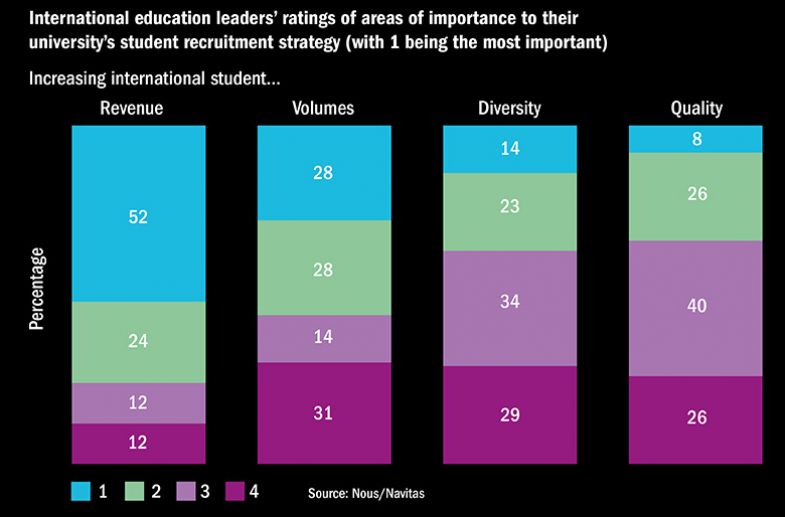Western universities are prioritising increasing overseas student recruitment and revenue over improving diversity and quality despite the risks that this brings in the “hypercompetitive” post-pandemic environment, according to a major survey.
In the poll of more than 100 international education leaders in Australia, Canada and the UK, published on 16 February, more than half said that the number one priority of their recruitment strategy was increasing revenue. More than a quarter ranked student volumes as their first concern, with less than one in seven nominating student diversity and one in 12 citing student quality.
“If you asked any deputy vice-chancellor, they would say diversity is certainly very important,” said report co-author Jon Chew, global head of insights and analytics at private education company Navitas. “But at most institutions it’s not going to come ahead of revenue and volume.”
The report, produced by Navitas with education consultancy Nous Group, warns that there are “real risks” to student retention, experience and outcomes when universities pursue volume and revenue “at the expense” of quality and diversity.

Mr Chew said it was also dangerous to assume that if student numbers rose, the dollars would “flow through later”. Almost all survey respondents said that they expected competition for overseas recruitment to be higher or much higher than pre-pandemic levels, with the report warning of a risk that “the cost of recruiting students rises substantially, leading to increased volume without the revenue returns”, especially if a slow recovery in Chinese student flows means that institutions have to put more effort into recruiting from other markets to compensate.
Report co-author Matt Durnin said the sector was struggling with “cognitive dissonance” as it shifted into Covid recovery mode. “One of the narratives that’s emerged during the pandemic is a renewed emphasis on diversifying international student cohorts,” said Mr Durnin, a principal with Nous.
“Yet, we still see that strong focus on revenue generation. A lot of universities haven’t fully reckoned…that diversifying their student source markets is going to dramatically increase per-student acquisition costs.”
The report also says recruitment tactics need careful consideration. While most respondents planned to increase tuition fees – typically by between 4 per cent and 5 per cent in Australia, and perhaps in excess of 5 per cent in the UK – highly ranked universities were much likelier than their less prestigious counterparts to say that they would invest more in scholarships to boost recruitment.
Some lower-ranked institutions “will already be at a price point where discounting won’t result in increased volumes, but these universities will face more competitive pressure given [that] higher-ranked universities will be discounting”, the report warns. Mr Chew said discounting during the pandemic had reached 40 per cent for learners studying online from abroad.
While roughly four in 10 respondents expected to raise their entry requirements for international students, and a similar proportion expected to hold them steady, about one in five said that they would lower them.
And although most respondents remained optimistic about the overall prospects for global student mobility post-Covid, UK respondents were significantly more likely to identify anti-immigration sentiment as a risk to their internationalisation strategies. Six in 10 British respondents flagged this as a danger, compared with one in three Australians and one in 10 Canadians.
Macroeconomic conditions and geopolitical tensions were listed as concerns by a majority of Australian and UK respondents, who also named academic integrity and visa fraud as areas of worry.
International education leaders in Canada were less likely to express concern, and the report warns that Canadian universities risk being “caught off guard” in the post-pandemic environment. Just one-third of Canadian respondents said that they expected competition to be “much higher” in the next three years, compared with 45 per cent of UK respondents and 61 per cent in Australia.
“With a very open immigration pathway [and] generous post-study work rights, the policy settings have just been so favourable [that] Canadian institutions haven’t historically had to be as attuned to geopolitical shifts. What’s changed during the pandemic and this post-pandemic era we’re now entering is that demand is starting to soften. There’s going to be more pressure to align to these external forces but they haven’t quite made that adjustment yet,” Mr Durnin said.
Overall, more than nine in 10 respondents said internationalisation was a high priority at their institutions and almost eight in 10 said it was well supported by the university leadership, but less than four in 10 said it was adequately resourced.
POSTSCRIPT:
Print headline: Prioritising revenue ‘may harm quality and diversity’
Register to continue
Why register?
- Registration is free and only takes a moment
- Once registered, you can read 3 articles a month
- Sign up for our newsletter
Subscribe
Or subscribe for unlimited access to:
- Unlimited access to news, views, insights & reviews
- Digital editions
- Digital access to THE’s university and college rankings analysis
Already registered or a current subscriber?








